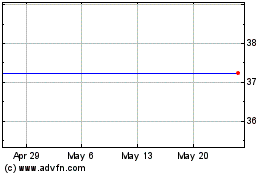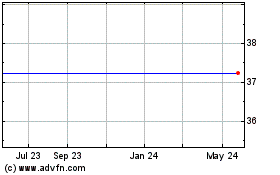Exelon COO: Annual Synergies From Constellation Deal Will Be $250 Million
April 28 2011 - 11:20AM
Dow Jones News
Top executives at Exelon Corp. (EXC) said the power producer
will further diversify its generation portfolio, expand its retail
footprint and cut costs by acquiring Constellation Energy.
However, Exelon will not pursue any new nuclear development in
the near-term because of poor economics, executives said in an
interview.
Earlier Thursday, the Chicago-based company announced intentions
to purchase Constellation in a $7.9 billion all-stock transaction.
The news sent Constellation shares 4.5% higher to $35.85 and
Exelon's stock has edged up 0.3% to $41.60 a share.
Exelon first approached Constellation last November because
their business models are similar, said Chris Crane, chief
operating officer of Exelon, who will become chief executive after
the deal closes.
The company chose Constellation after carefully reviewing
regulatory issues around the country. The regulatory environment
has improved in Maryland after FirstEnergy Corp. (FE) was able to
receive approval to acquire Allegheny Energy recently, Crane
said.
"We have looked closely at the most recently approved
transaction ... and we have scaled our offer off of that," Crane
said.
The deal is expected to close later this year.
Both companies have merchant businesses, nuclear plants and
utility operations. Exelon will increase its nuclear power capacity
through the deal, but the company will not pursue projects to build
new nuclear reactors, executives said.
"In the near-term new nuclear plants are simply not economic"
with natural gas prices between $4-$5 per million British thermal
units, said Exelon Chief Executive John Rowe, who will retire after
the deal closes. Gas is a fuel used to generate electricity and low
natural gas prices have driven the price for wholesale electricity
down in recent years.
Electricite de France SA (EDF.FR) currently has a stake in
Constellation's existing nuclear fleet, and that partnership will
not be affected by the deal. Late last year, Constellation pulled
out of a separate partnership with the French utility to build new
generation in the U.S. because of poor economic conditions.
Constellation also ended its bid to build a third reactor at an
existing nuclear facility in Calvert Cliffs, Md., after seeing
unfavorable terms from a Department of Energy loan guarantee. EDF
continues to pursue the project.
"We won't be involved in it; that is an EDF venture," Crane
said.
Nuclear power will represent 55% of the combined company's total
power-generation fleet of 34,401 megawatts.
Meanwhile, by streamlining operations through the Constellation
acquisition, savings will be about $250 million annually, Crane
said.
"We are not ready to predict actual headcount reductions,
computer savings, technology advances or liquidity costs savings,"
he said. However, by having a greater retail footprint, the
combined companies will be able to reduce collateral needed for
merchant-power transactions to $3 billion to $4 billion from the
current total of $10.3 billion.
To close the deal, the companies may need to divest about 2,600
megawatts of generation in the mid-Atlantic electricity market
operated by PJM Interconnection LLC, executives said during a
conference call.
-By Naureen S. Malik, Dow Jones Newswires; 212-416-4210;
naureen.malik@dowjones.com
Constellation Energy (NYSE:CEG)
Historical Stock Chart
From Jun 2024 to Jul 2024

Constellation Energy (NYSE:CEG)
Historical Stock Chart
From Jul 2023 to Jul 2024
